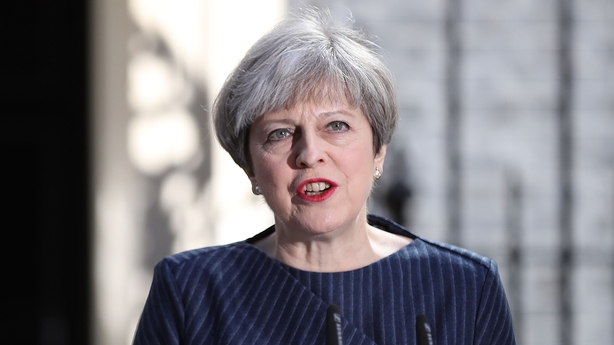Ireland's EU Commissioner Phil Hogan has said he believes the British Prime Minister Theresa May might be persuaded to stay in the EU Customs Union.
Mr Hogan said Mrs May did not mention the Customs Union in her letter triggering Article 50 to commence the Brexit process.
Speaking on RTÉ’s This Week programme, he said it "indicated she has an open mind on staying in the Customs Union and this is very important for north and south of Ireland and border relations between the UK and the rest of the EU".
He added: "I hope in the negotiations she will see the error she made in 2016 in articulating she might leave the Customs Union and that we will able to persuade her it is in the best interests of everyone, including the UK, that she stays in the Custom Union."
The Commissioner said the UK election could prove a positive development for Ireland. Mr Hogan said he predicted last October the British Prime Minister would want a bigger majority in the House of Commons "in order to sideline some of the people that are going to be difficult for her when it comes to the choices and compromises that have to be made".
Asked whether the EU will still adopt a tough stance in negotiations, regardless of the size of a majority she might win he said the decision of the UK electorate was always going to have consequences for them.
"Of course, if you are outside the single market it is not the same as being in a trading block of 500 million people. It is not about punishment of the UK electorate for the fact they've left the EU. This is about being practical and pragmatic on a set of rules," he added.
Mr Hogan said recently there were some "soundings and statements" from Mrs May and members of her government that gave some hope she is changing from the hard Brexit view she took at the Conservative Party conference last October.

He cited statements on issues like immigration, dispute resolution mechanisms involving the European Court of Justice and Britain's budgetary contributions to the EU that suggested there may be some room for flexibility.
"This is very heartening," he added.
The Commissioner said he was fully confident that Ireland's interests - including the border, the Good Friday Agreement and the Common Travel Area - would be explicitly referenced in the text following next weekend's EU Council meeting with government leaders.
Looking to the Brexit negotiations, Mr Hogan said he was hopeful the talks would result in a trade deal to protect Irish interests, including agriculture. He said there is always a worry about what tariffs might apply but these issues have to be negotiated in the time ahead.
Commissioner Hogan said that the UK was starting to realise they could not do free trade agreements with countries in Indonesia, the far east and elsewhere in advance of negotiations being concluded with the EU.
It was clear, he said, that the United States had also taken the position to do a deal with the EU first and the UK second, which underlined the difficulty the UK will have in securing any stand-alone trade deals before Britain's relationship with the EU is sorted.
He highlighted the case of Mrs May's recent bid to secure a trade deal with India, in return for which she was asked to provide 10,000 visas.
"This is a completely different journey that she's on now," he said, with regard to the difference between the hardline immigration rhetoric of the referendum campaign and the reality of trying to secure international trade deals now, in a scenario where trading states want more visas for their citizens to enter the UK.
"The European Union has a 460 million population. The UK has a 60 million population. Size matters when it comes to trade," Mr Hogan said.

